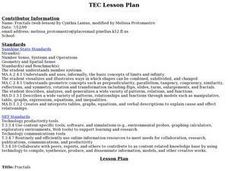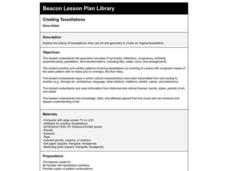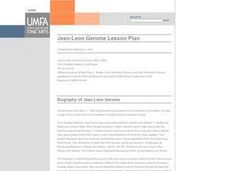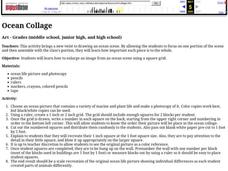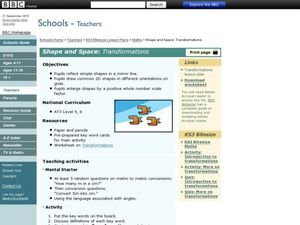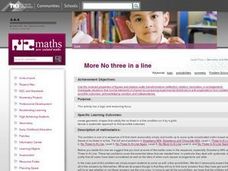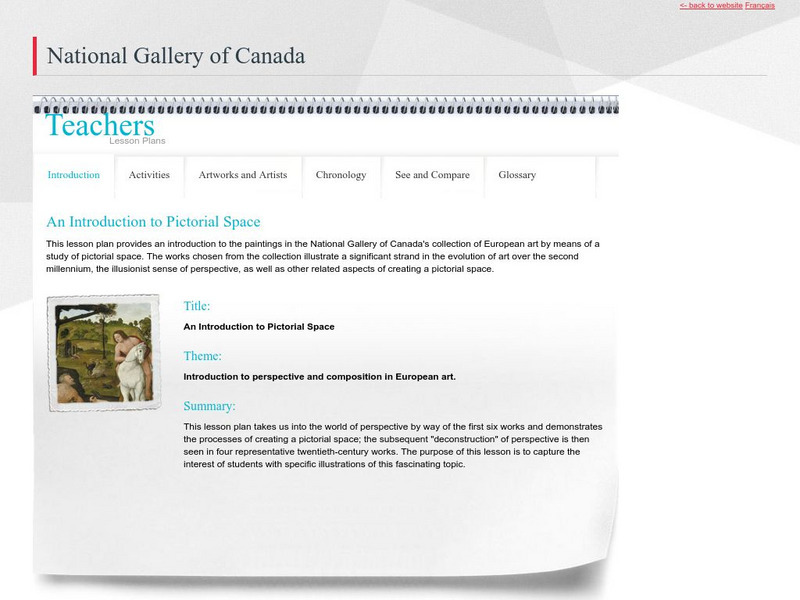Curated OER
What are Fractals?
Middle and high schoolers identify and analyze fractals and research information using the Internet to locate information about them. They look at fractals in relation to nature and other real world situations. Pupils create several...
Florida Center for Reading Research
Fluency, Letter-Sound Correspondence, Make a Match
An activity tests the fluency skills of young readers. Scholars match initial sound cards to letter cards. Pairs take turns and work to locate the most matches before the timer goes off. The activity ends with a peer evaluation.
Mathed Up!
Mixed Transformations
Viewers learn how to identify and perform a variety of transformations with a video that provides seven items on transformations. Pupils demonstrate their understanding of dilations, reflections, rotations, and translations. The video...
Curated OER
Circular "Mandala"
Students create a nonobjective design from a magazine photo (or personal photograph) using a view finder. By using colored pencils the drawing use layers to recreate the colors in the magazine picture.
Curated OER
Marine Life: Anatomy of a Humpback
Third graders prepare for a trip to view marine life. In this science lesson plan, 3rd graders assemble a picture of a Humpback whale on a grid.
Curated OER
Facial Tattoos or Face Painting
Students use a grid-like method to create a life-size self-portrait from a 3X5 black and white photo. They explore the different customs and rituals surrounding face painting from ancient through modern civilizations. Students create a...
Curated OER
Faux-Antique Foil Reprousse Frames
Students create beautiful picture frames in low relief using tooling foil and other basic supplies.
Curated OER
Creating Tessellations
Third graders explore the history of tessellations; then use art and geometry to create an original tessellation.
Curated OER
Pixel Painting
Learners study the artwork of Chuck Close to examine Photorealism. They create a pixel painting using a monochromatic color scheme.
Curated OER
Flow Charts
Students explore the use of flow charts and cyclical diagrams. They discuss how to read the charts. Students produce a simple flow chart or diagram to explain a process. They investigate various methods used to present text.
Curated OER
Jean-Leon Gerome Lesson Plan
Students explore works by French painter Jean-Leon Gerome. In this visual arts instructional activity, students investigate the use of perspective in Gerome's work and then make their own drawings that feature the use of perspective.
Mathed Up!
Congruent Shapes
Are congruent shapes compatible? Congruent shapes are identical to one another, and throughout the assessment, young mathematicians identify given shapes as congruent.
Curated OER
Heroes Portrait
Eighth graders investigate art appreciation and Renaissance portraits through time. They create a portrait.
Curated OER
Amazing Animals
Students participate in an animal research report. They present a PowerPoint presentation to the class and follow specific instructions when it comes to what to include in the report.
Curated OER
What's My Ratio?
Students investigate ratios of various objects. In this ratios of various objects lesson, students draw pictures on graph paper and then dilate or shrink the image. Students determine the ratio of their pictures. ...
Curated OER
Ocean Collage
Students re-create an image from a marine life scene. They are given a single square of the entire picture to focus on. When all squares are completed, the picture is assembled.
Curated OER
Looking at the World Through the Eyes of Chuck Close
First graders examine and analyze various works of art by Chuck Close. They listen to a book about Chuck Close, discuss images of his artwork, and create original paintings in the style of Chuck Close.
Curated OER
Shape and Space: Transformations
Students explore transformations. In this mathematical transformations lesson, students define quadrilaterals, convert centimeters to meters, and complete a transformations worksheet.
Curated OER
The Mysterious Person
Young scholars each create a small piece of a larger picture. When assembled the final piece match a photograph of a famous individual.
Curated OER
Documentation: A Portrait and a Place
Seventh graders create a book entitled, "Who Am I?" They utilize art activities with related social studies writing assignments, and gather information from family sources.
Curated OER
Where Can I See The Sea?
Students see how the pieces of the fossil puzzle fit together to allow the paleontologist to imagine the earth as it was millions of years ago. They draw a map showing what environments were present in a certain area more than 70 million...
Curated OER
More No-Three-In-A-Line
Fourth graders read Mary's problem and make sure that they examine it.
After some discussion, let the class work on the problem in their groups.
They then take turns in putting a picture of their arrangement on the board.
National Gallery of Canada
Cybermuse: Introduction to Pictorial Space
A site featuring the work of Cezanne, Monet, Picasso, and Mondrian, among others, that explores pictorial space in a composition There are lesson plans for ages 4-18, and a great section where works are juxtaposed for comparison. Use the...
